How to Improve Your English Vocabulary
Many posts about improving your vocabulary have really obvious advice.
These articles tell you to read, write down new words, and practice using your new vocabulary as much as possible.
These are good tips, of course, but you’ve probably already figured these things out on your own.
In this article, I wanted to cover specific tips for improving your English vocabulary that you probably haven’t heard a thousand times already.
Here are 17 specific things you can do to acquire more vocabulary.
1. Use Anki Flashcards
Anki is the Japanese word for memorization, and there is nothing better than Anki digital flashcards for committing things to memory.
Anki flashcards use spaced repetition This means that you study your flashcards at gradually increasing intervals.
So if you have a flashcard for the word ecstatic in your Anki deck, you might see that card four times in week 1, twice in week 2, once in week 3, and then not again until week 5 or so.
Here is the front of an Anki flashcard for the word ecstatic:
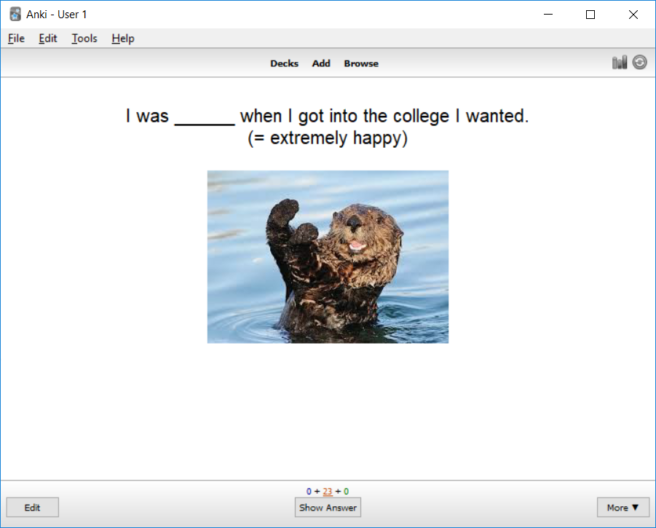
Once you select “Show Answer” you’ll see the answer (and also hear any audio files that you upload to the back of the card):
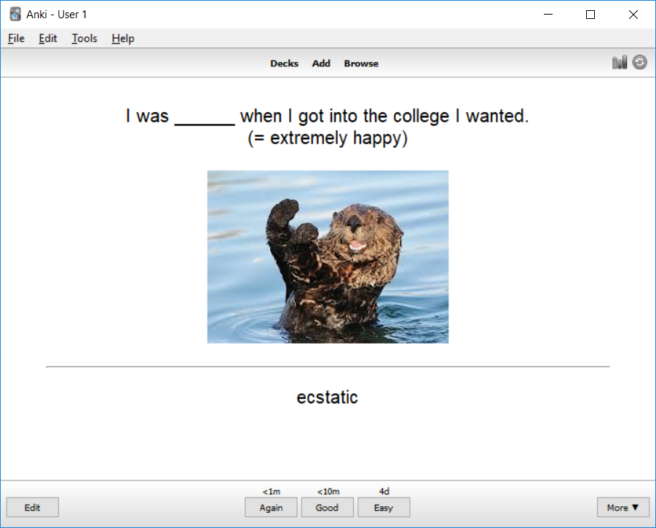
Here is what a good Anki card should have:
• A fill-in-the-blank sentence you can relate to. If you’d like, you can give yourself a hint after the sentence. Make sentences about real, important things in your life. (Research shows you are much more likely to remember something that you have an emotional connection to.)
• A picture (do a Google image search and copy and paste a relevant image)
• An audio file of the pronunciation of the word. You can use forvo.com to download audio files of native speakers pronouncing just about any word in English. (You will have to create a free account before you can download the files.)
Your Anki cards should not include your native language at all. They should be 100% in English.
You can download Anki here.
Here is a video tutorial from fluent forever on how to download the software and get started with Anki. You can synchronize your Anki decks across multiple devices, but it’s best to create your cards on a desktop or laptop.
Personally, Anki has helped me increase my Spanish vocabulary. If you create a card for a word, it’s nearly impossible to forget it (assuming you’re using the software, of course). I strongly recommend that you get started with this powerful tool.
Also, note that Anki isn’t the only spaced-repetition flashcard program. Some similar programs are Memrise, Quizlet, Brainscape, and Cram. If for some reason you don’t like Anki, try one of those programs.
2. Relate new vocabulary to things that are important to you
I included this advice in tip #1, but it’s worth repeating. Even if you don’t use Anki or another flashcard program, you can still benefit from creating sentences which you have a strong emotional connection to.
Let’s say you want to learn the idiom to draw a blank, which means to not be able to remember something.
Which of these sentences do you think will help you remember the idiom more?
It’s common to draw a blank when you’re trying to think of someone’s name.
I was so embarrassed last week when I ran into a former coworker and couldn’t think of her name. I totally drew a blank!
The second sentence involves a personal, emotional connection (assuming it actually happened to you). This connection will help you remember the idiom.
3. Read, watch, and listen to everything more than once
This sounds like obvious advice, but when was the last time you watched a movie in English multiple times just so you could pick up more vocabulary? Or when was the last time you read a news article multiple times because you wanted to read the new vocabulary terms more than once?
if you’re serious about learning vocabulary, you need to give yourself the repetitions you need to really learn new words. The repeated exposure will help you tremendously.
After reading, watching, or listening to something multiple times, you can create Anki flashcards for the new terms you’d like to learn.
4. Learn the subtle differences between words
Do you know the definition of synonym?
It’s not a word that is exactly the same as another word. A synonym is “a word or phrase that has the same or nearly the same meaning as another word or phrase.” (Cambridge Dictionary)
What this means is that there is usually a subtle difference between synonyms.
Here are some ways two similar words can be different:
• Words can have different levels of intensity (e.g. to run vs. to sprint or hot vs. scorching). We call this shades of meaning. For more examples, see these shades of meaning in adjectives and these shades of meaning in verbs.
• Some words are direct/impolite while others are indirect/polite (e.g. poor vs. underprivileged or to die vs. to pass away). For more, see these 100+ polite euphemisms you should know.
• Some words are more common than others. Controversial and polemic have basically the same meaning, but controversial appears 39,320 times in BYU’s Corpus of Global Web-Based English, while polemic only appears 1,420 times. This means that controversial is about 27 times more common than polemic. This is important to know!
• Some words are more formal than others. Relaxing and chillin’ have similar meanings, but you probably don’t want to use chillin’ in formal settings.
• Words can have very different connotations. Connotation means “the feelings or ideas that words give in addition to their meanings.” (Cambridge Dictionary) Some words have a positive connotation (inexpensive), while others have a negative connotation (cheap). It’s important to know the difference.
• Words can have slightly different definitions. An example of this is cheap and stingy. We use cheap to talk about people who are unwilling to spend money, but we use stingy to talk about people who are unwilling to share or give things to other people. They’re similar, but different.
So how do you learn the subtle differences between words? You ask, of course. Ask someone who speaks better English than you, or ask Google. Never assume that two words are 100% the same.
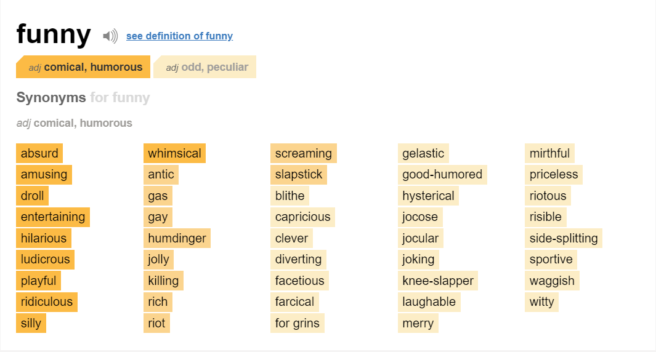
5. Learn collocations
A collocation is two or more words that go together and sound right to people who have spoken the language all their lives.
For example, if you’re spending the winter in New York, and the weather is warmer than it normally is, you are enjoying a mild winter.
Mild winter is a collocation. It sounds right because it’s what we normal say. Soft winter and light winter both sound unnatural.
When you’re learning English terms, you also need to learn the collocations. Otherwise, you’ll sound unnatural.
To find natural-sounding collocations, you can use the Oxford Collocation Dictionary.
It works like this: You type in a word, and the dictionary gives you natural-sounding collocations and example sentences.
Here is a screen shot of what you get if you search for vocabulary:
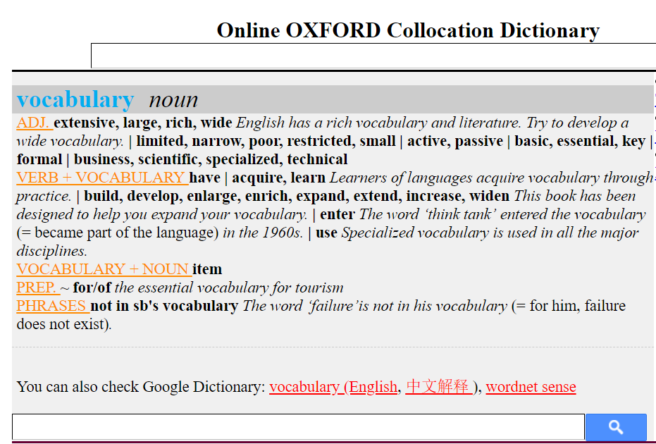
All the words in bold sound natural with vocabulary.
Once you learn the collocations, you can create Anki cards for them. Here is an example of an Anki card with some sports collocations:
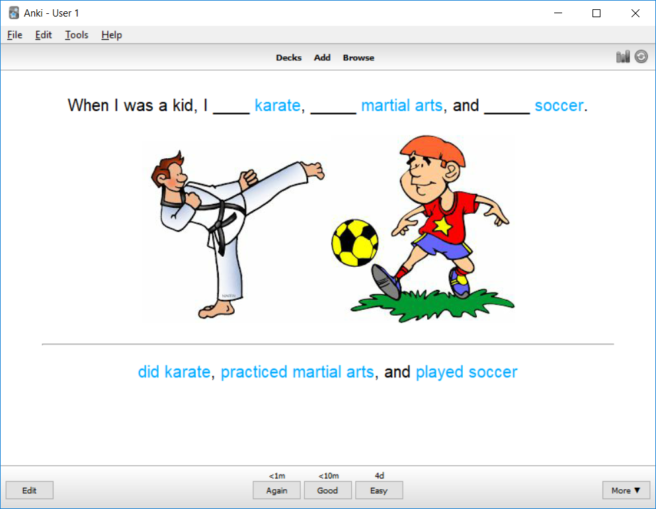
You’ll want to pay particular attention to English collocations that are different from the collocations in your native language. For example, in Portuguese and Spanish you make a party, but in English you have a party.
6. Focus (mostly) on one topic at a time
You may have taken an English course where each unit was organized around a central theme (food, travel, family, education, etc.).
There’s a reason textbooks are broken into thematic units like this—it makes it easier to learn vocabulary. You see the same words over and over again, and you can relate the new terms to each other.
You can take advantage of this when you learn English vocabulary on your own. Pick a topic that you need more vocabulary for, and then find books, TV shows, articles, podcasts, etc. related to that theme. Then move on to another theme.
7. Learn the entire word families of new words you learn
Let’s say you’ve just heard the word enroll and you want to remember it. Instead of just creating an Anki flashcard for enroll, find other words in the word family, such as enrolled (adj.) or enrollment (n), and add them to your flashcard as well.
It might look something like this:
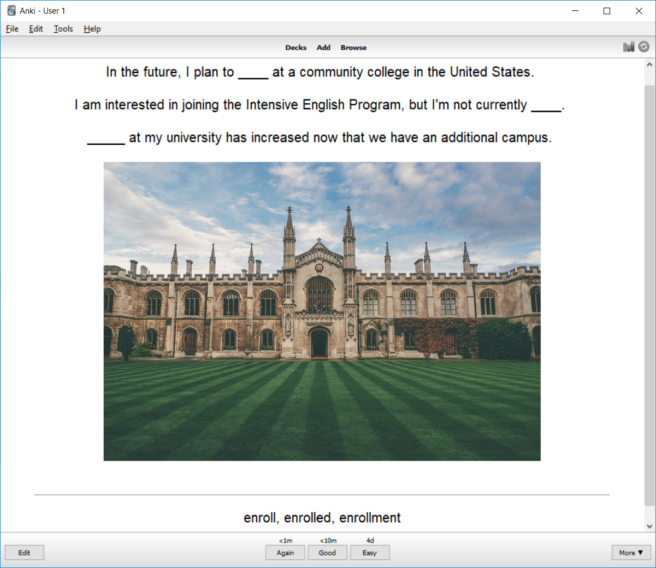
8. Learn Greek and Latin root words
Learning root words will help you identify unfamiliar words.
For example if you see the word geothermal, you can make an educated guess about its meaning if you know some common root words. Geo normally refers to the earth (geography, geology, etc.), and therm normally refers to heat, so you can conclude that geothermal probably has something to do with the earth’s heat. (You should also be able to identify that it’s an adjective because it ends with al.)
Learning these roots will help your vocabulary immensely by allowing you to logically deduce the meaning of words.
Here are a few examples of roots and their meanings:
anti = against
jur = law
graph = write
terr = earth
Check out this excellent article from ThoughtCo with 50 examples of Greek and Latin root words. You probably know many of them without ever having realized it.
9. Keep your native language out of it
If you know a word in your native language and would like to find the English equivalent, by all means use Word Reference to find a suitable word. (Word Reference gives you example sentences so you have enough context to be reasonably sure you’re choosing the correct word. Google Translate, not so much.)
But if you come across a new word or expression in English, don’t look up its translation in your native language. Instead, use an English dictionary to find its meaning.
A dictionary that I particularly like for its easy-to-understand definitions and example sentences is YourDictionary.
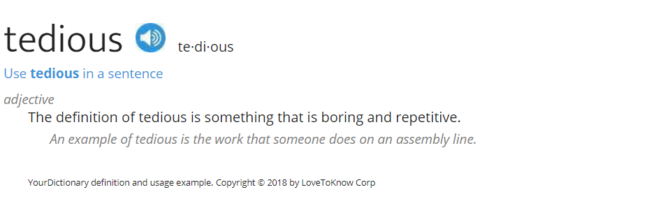

10. Consider getting a picture dictionary
Picture dictionaries, such as the Oxford Picture Dictionary, can help you accelerate your vocabulary by breaking vocabulary into thematic units with pictures.
For some advanced learners, the terms may be too basic, and investing in a picture dictionary might not be worth it. If you’re considering getting a picture dictionary, look through some of the sample pages to determine whether it’s a good fit for you.
Here is a sample page from the Oxford Picture Dictionary:
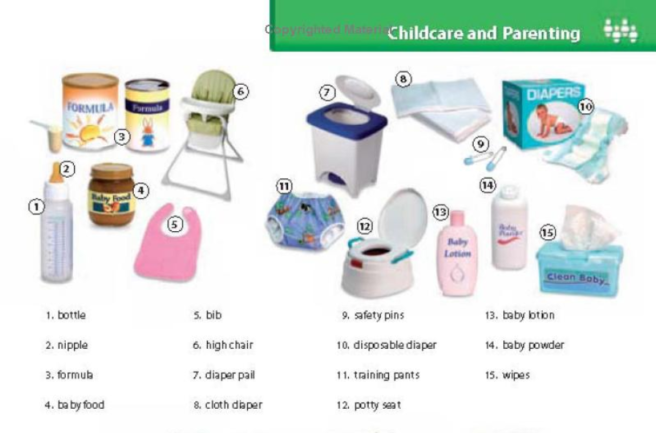
11. Listen and read at the same time
Reading is wonderful, but it doesn’t help you with your pronunciation.
But, if you read a book while listening to the audiobook at the same time, you will hear the correct pronunciation of the words as well as the rhythm and intonation of the sentences. Reading and listening at the same time will also prevent distractions and keep you focused on reading.
12. Listen to podcasts on your commute
What do you do during your daily commute? Do you listen to music? Do you sit in silence?
One way to be more productive and learn some vocabulary is by listening to podcasts on your daily trip to and from work. If your commute is 45 minutes each way, you could listen to almost 400 hours of English podcasts in a year.
I recommend CastBox for this. It’s free in the Google Play and Apple Store, and has a great selection of podcasts.
Of course, you’ll want to follow tip #3 and listen to your podcasts multiple times.
13. Stop wasting your time on social media—use your phone time to improve your vocabulary
The average internet user spends 135 minutes per day on social media. Over a year, that’s about 821 hours, or over twenty 40-hour work weeks!
Imagine if you devoted your social media time (or at least a significant portion of it) to improving your English. You’d make great strides over the course of a year.
So get off social media and spend that time reading in English, listening to podcasts in English, or studying your Anki flashcards.

14. Ask your conversation partners for feedback
I’m sure you’ve had conversations in your native language with people who are still learning your language. Do you normally correct these people when they make grammar and vocabulary mistakes? Probably not, right? You might ask them to repeat themselves or ask for clarification, but you probably won’t correct them if they misuse a word.
The same things is happening to you when you speak English. People aren’t going to correct you unless you ask. If you have friends who speak good English, politely ask them to start correcting you when you use words incorrectly.
15. Get free speaking practice
Obviously, you have to practice using the vocabulary you’re learning. If you don’t have a whole lot of speaking opportunities in English, you’ll have to get creative.
Fortunately, there are plenty of places on the internet where you can get speaking practice.
Check out this post from FluentU for some ideas. Some cost money, but many, such as busuu, are free.
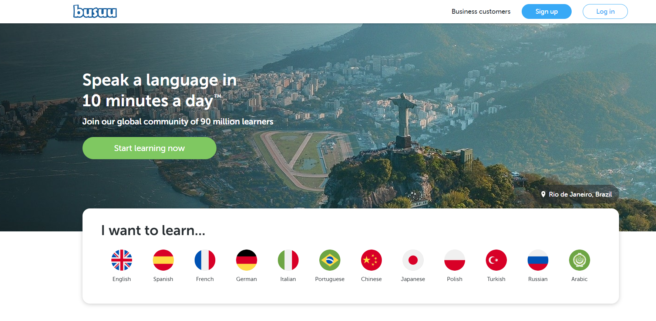
16. Switch your inner monologue to English
I’m sure that your inner voice is in your native language. (If you naturally think in English more than in your mother tongue, your vocabulary and comfort with the language are probably already pretty spectacular.)
One way to improve your vocabulary is to force yourself to think in English. This will help strengthen your vocabulary by making you aware of your vocabulary gaps. When you get stuck, look up the word or phrase you need.
17. Switch everything you can to English
You want to get as much exposure to English as possible. Are your phone’s settings in English? How about your browser? Your television?
If you change the settings to English, you’ll learn more words. It might not sound like much, but every little bit helps. Try to immerse yourself as much as possible.
You may have noticed that a lot of these tips require hard work. It takes time to create Anki cards with sentences you have a personal connection to, and reading articles multiple times probably isn’t as much fun as killing some time on social media.
But anything worth doing is going to involve at least a little suffering. It will all be worth it when you realize your developed vocabulary allows you to communicate better in English.


